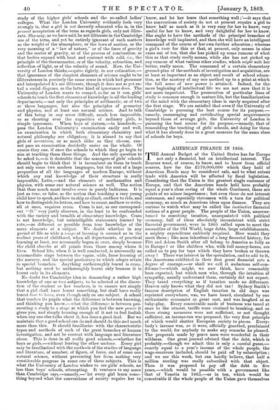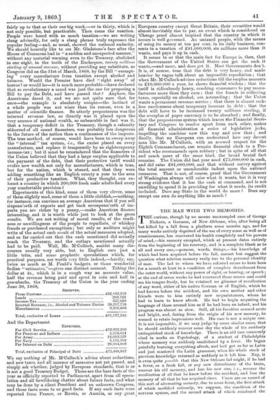AMERICAN FINANCE IN 1868.
THE Annual Budget of the United States has for Europe not only a financial, but an intellectual interest. The Bourses want, of course, to know, and to know from official sources, how far the £170,000,000 which they hold of American Bonds may be considered safe, and to what extent trade with America will be affected by fiscal legislation. Considering that the Union is the greatest single customer of Europe, and that the American bonds held here probably equal a year's clear saving of the whole Continent, these are points of no minor importance ; but even these do not interest statesmen, and especially statesmen with a turn for political economy, so much as American ideas upon finance. They are curious to watch what may be called the instinctive financial notions of a great people. The people of the Union, unaccustomed to searching taxation, unacquainted with political economy, full of ideas absolutely inconsistent with strict financial government, were in 1865 called upon to meet the necessities of the Old World, huge debts, large establishments, a mighty expenditure suddenly required. How would they meet them ; like men inheritors of a long financial history, for Pitt and Adam Smith after all belong to America as fully as to Europe ? or like children who, with full money-boxes, are called on to pay for toys which they have broken or thrown away ? There was interest in the speculation, and to add to it, the Americans exhibited in their first great financial acts a degree of courage,—or shall we call it audacious self-confidence I—which might, we now think, have reasonably been expected, but which men who, through the intuition of sympathy, usually understand them, certainly did not expect. They taxed everything as if taxation made no difference. Heaven only knows what they did not tax ! Sydney Smith's famous description of English taxation in old days was reprinted everywhere, was, we have heard, circulated by one enthusiastic economist at great cost, and was laughed at as baby-play. Every conceivable mode of business was taxed at once to the utmost, tariffs were strained to breaking, and as these strong measures were not sufficient., or not thought sufficient, an income-tax was proposed, the very first principle of which would shatter European society to pieces. Everybody's income was, as it were, officially gazetted, proclaimed to the world, for anybody to make any remarks he pleased. The proposals made by grave men were wonderful in their wildness. One great journal advised that the debt, which is probably,—though we admit this is only a careful guess,— exactly equal to a year's income of the whole people, the wage-receivers included, should be paid off by subscription ; and we see this week, but can hardly believe, that half a million sterling was really subscribed with that object. Then it was proposed to pay off the debt in five years,—which would be possible with a government like that of Venetia in 1865,—or in ten, which would be conceivable if the whole people of the Union gave themselves fairly up to that as their one big work,—or in thirty, which is not only possible, but practicable. Then came the reaction. People were bored with so much taxation—we are writing slang advisedly, for only a slang phrase truly expresses the popular feeling—and, as usual, showed the national audacity. We should honestly like to see Mr. Gladstone's face after the House of Commons had in "a sudden and unexpected manner," without any material warning even to the Treasury, abolished in one night, in the teeth of the Exchequer, twenty millions sterling of annual revenue, without providing any substitute, as Congress did on the 31st of March, 1868, by the Bill " exempting " every manufacture from taxation except alcohol and tobacco. Would the Premier have died "right away" of horror? or would he—it is much more probable—have declared that so revolutionary a mood was just the one for proposing a Bill to pay the Debt, and have passed that ? Anyhow, the Americans dared it, and we are not quite sure that for once—the example is absolutely unique—the instinct of a whole people was not wiser than its reason, even in a matter of scientific finance. So utterly preposterous was the internal revenue law, so directly was it placed upon the very sources of national wealth, so unbearable in fact was it, that a temporary deficit in the Treasury, though a calamity abhorred of all sound financiers, was probably less dangerous to the future of the nation than a continuance of the imposts. The true method, of course, would have been to sweep away the " internal " tax system, i.e., the excise placed on every manufacture, and replace it temporarily by an eighteenpenny income-tax ; but it must be remembered that the financiers of the Union believed that they had a large surplus applicable to the payment of the debt, that their protective tariff would evolve new wealth not only for manufacturers, which is true, but for the nation, which is absurd, and that they were adding something like an English county a year to the area of their productive taxation. What, they thought, can exhaust a country in which 200,000 fresh male adults find every year comfortable provision ?
Experiments of this kind, some of them very clever, some of them slightly mad, some of them a little childish,—nothing, for instance, can convince an average American that if you sell sixpenn'orth of exports and get back sevenpenn'orth of imports you are richer by a penny,—make American finance interesting, and it is worth while just to look at the gross results. We are not writing of moral results, of the readiness or unwillingness of the people to repudiate, of whiskey frauds or purchased exemptions ; but only as auditors might write of the actual cash result of the actual measures adopted, and so far carried out that the cash mentioned did actually reach the Treasury, and the outlays mentioned actually had to be paid. Well, Mr. M'Culloch, amidst many dis courses usually very able, but to English ears just a
little trite, and some prophetic speculations which, for practical purposes, are worth very little indeed,—hardly, say,
twice as much as M. Fould's budgets, or those wonderful Indian "estimates,"—gives one distinct account. Taking the dollar at 4s., which is in a rough way an accurate value, half the revenue being paid and spent in coin and half in greenbacks, the Treasury of the Union in the year ending June 30, 1868,



































 Previous page
Previous page